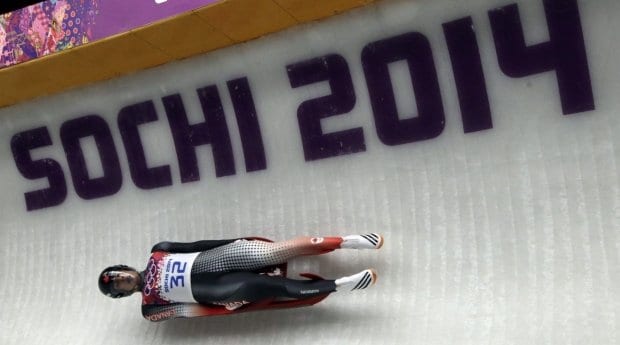Sitting in his luge at the start handles of the World Cup run in Latvia in January, 18-year-old John Fennell felt like he was suffocating.
“I was very anxious. I was breathing deeply and thought to myself, ‘How the hell can I be brave enough to go down this mountain if I’m not brave enough to be who I am?’”
Fennell made the Canadian Olympic team and competed in the Sochi Games one month later. He doubts he would have made it that far had he not spoken several months earlier to openly gay Olympic swimmer Mark Tewksbury.
“I said, ‘I don’t know if I can go to Russia. I don’t think I can go,’” he recalls of his life-changing conversation with Tewksbury. “He’s integral to my success and continuance in my sport. I could not see myself going forward had I not reached out and him giving me the advice that he did. He’s, in all honesty, one of the best human beings I know.”
Without Tewksbury, things “may have played out much differently,” Fennel says. “I might have felt the need to have retired after the Olympics. But hearing the things he has to say about the way sport culture is now, it really reformed my preconceived notions of how you’ll be treated for coming out.”
Buttressed by Tewksbury’s advice and support, Fennel reached out to some of his teammates and the Canadian Olympic Committee and entered the Sochi Games with a clear mindset, knowing he had people on his side.
Fennell grew up within view of the ski-jump tower built for Calgary’s 1988 Winter Olympic Games. Though he never really hid his sexuality, he dated girls in high school while he slowly sought to better understand himself.
He says he feared what would happen if he came out. “I would have to quit my sport,” he says he believed then. “People who were my friends wouldn’t want to be my friends anymore.”
Pre-Olympic season is stressful enough, he says, without the added burden of wrestling with coming out. It was “taxing and emotionally weighing. I had short tempers. I was snapping really quickly, even during our team debriefing.”
The lead-up to the Games was “definitely terrifying,” he says. “I had worked so hard [to] qualify for something, and having that feeling that I had to give that up, that was the hardest part.”
Added to that stress was the international pressure being brought to bear upon Russia and the possibility that the Games’ host country, which had only months earlier passed anti-gay legislation, would be less than welcoming.
“I was terrified,” Fennell recalls, though his experience in Russia turned out to be only positive. “It was very safe. I didn’t feel scared at all.”
Fennell competed in Sochi and finished 27th in his first Olympic competition. “After my events finished, I told myself, ‘Okay, John, you’re going to deal with this.’
“I came out to my team leader, Sam Edney. He’s very close to Anastasia [Bucsis, the Canadian Olympic speed skater who came out before the Games]. Sam put me in touch with her in Russia, and she became one of the most useful people that I have ever interacted with.
“We had numerous long talks,” he says. “She put me in touch with other athletes who were dealing with this. She stepped up to be a personal role model for me, and what I told her recently is ‘I want to be able to help athletes like you helped me. You made me feel safe and proud of who I am.’”
When Fennell came home, he came out to his friends, family and the rest of his team. “Everyone’s been overwhelmingly supportive and there for me,” he says.
Gay youth need a voice in sports, he says now, encouraging athletes in their early teens to stick with their sport and not quit just because of their sexual orientation.
“There’s still, particularly in sport, a need for role models,” he notes. “It’s one thing when professional sports like basketball and football players are coming out, but there’s a whole plethora of different athletes who are experiencing this. You don’t have to be someone famous to come out.”

 Why you can trust Xtra
Why you can trust Xtra


